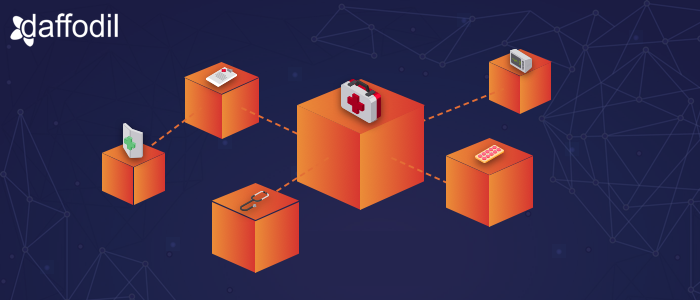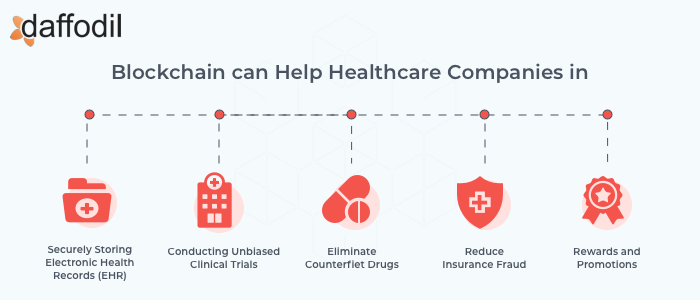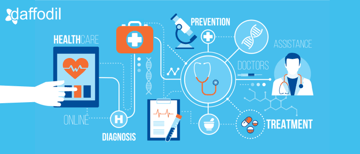
In Healthcare Industry, a lot of information exchanges happen between hospitals, doctors, clinics, pathology labs, blood banks, equipment manufacturers, and patients. Since the nature of the information is very confidential and personal, ensuring security of the data is of top most priority. At the same time, the information can’t be locked away in silos since ease of accessing this information is crucial to the functioning of an establishment providing healthcare services.
So, there is a need for secure transfer of information among various stakeholders and at the same time making this information available on-demand only to authentic users.
Blockchain is a blessing in disguise for healthcare companies!
Why?
Because, it emphasis on secure transfer of value, which in the case of healthcare industry is the patient’s data. It is a network of distributed systems (called nodes) that validate each transaction which happens in the network. In other words, a transaction in the network can’t happen if all (or pre-define percentage) of nodes validate the transaction.
It is projected that 55 percent of healthcare applications will have adopted Blockchain for commercial deployment by 2025. (Source Statista)

1. Securely Storing Electronic Health Records (EHR) and HIPAA Compliance
Securing digitally recorded Protected Health Information (PHI) has become a challenge for every healthcare organization after the introduction of compliances and regulations such as HIPAA. PHI includes information related to demographics, medical treatment, health conditions, laboratory test results, insurance information, and other data that a healthcare institute collects to identify an individual and determine his/her health service requirements.
The HIPAA Privacy Rule protects PHI stored or transmitted by a healthcare entity in any form or medium, whether electronic, on paper, or oral. It was designed to permit only certain uses and disclosures of PHI provided by the Rule and to create information that is not individually identifiable by following the de-identification standard and implementation specifications.
Blockchain can help in recording and sharing of PHI securely and ensuring HIPAA compliance. A patients EHR can be secured by asymmetric cryptography that generates public and private keys. The public key can be a unique identifier of the patient on the Blockchain network, while the private key can be used to decrypt the information.
The patients would only share private key with the practitioner/institute whom they want to authorize access to their information. Smart Contracts can ensure that the fetched information follow HIPAA Privacy rule on one hand, and on the other, they will ensure that the data generated from various healthcare stakeholders is in the required format as per the compliance.
Furthermore, the data can be stored on Blockchain in the form of cryptographic hashes, which makes it impossible to copy or change any data. SHA-256 is a “one-way” function that converts the text of any size into a unique fixed 32-character string which can’t be decrypted back to get the text. It. No two data pieces can produce the same string. If the data has been tampered, then it will produce a different string.
Read how can A.I. help in recording and maintaining medical records.
2. Unbiased Clinical Trials
The drug development companies are under immense pressure to ensure that their newly developed drug passes the clinical trials. Hence, they try to influence the organization carrying out clinical trials to produce reports in their favor. This is achieved by tampering with the original study protocol or by hiding or changing the test findings.
By implementing Blockchain solution for recording study protocol in the form of Smart Contracts, an organization performing clinical trials can showcase to the world that the trials carried out by them are unbiased, thus attracting more clients. Since the information stored is in the form of cryptographic hashes on the Blockchain, any tampering with the data can be easily pointed out.
3. Eliminate Counterfeit Drugs
According to the Health Research Funding Organization (HRFO), approximately 10-30 drugs out of 100 in developing countries are fake. Counterfeit drugs not only harm the business of drug manufacturers but can be life-threatening for the patients who consume them. US businesses lose up to $200 billion annually because of drug counterfeiting.
The lots of medicine produced and packed, having irreplaceable QR codes on the packaging and IoT sensors inside the box, can send data to the Blockchain about whereabouts of the package, its GPS location and the condition it is in (temperature/humidity) as they move from one node to another in the supply chain and get scanned. This time-stamped data gets recorded immutably on the Blockchain.
In such a Blockchain, the miners (members of the Blockchain who validate the transactions) would be the distributors and retailers. They who would accept the packages and verify the transaction, thus creating an immutable chain of custody of medicine on the Blockchain. If counterfeit products are found in the package, it can be traced back to the exact location at which the replacement of drugs would have happened and the concerned supplier/retailer can be held accountable.
Learn how a healthcare startup connected 500 doctors and 50 pharmacies across Kenya with 18000 patients, in less than 6 months of its launch via Healthcare Information Exchange Platform. Read more.
4. Reduce Insurance Fraud
The National Health Care Anti-Fraud Association (NHCAA) estimates that 3% of all health care spending in the U.S., or $60 billion, is lost to health care fraud. The Federal Bureau of Investigation (FBI) has estimated fraudulent billings to health care programs, both public and private, at between 3 – 10% of total health care expenditures. For committing such frauds, dishonest providers and patients submit claims/information to receive payable benefits. The billing for services not really performed, falsification of a patient’s medical condition to justify tests, etc. bring up the costs of healthcare insurance for everyone.
When the information is recorded on the immutable ledger of Blockchain, it is impossible to do any falsification of the data. Moreover, the information presented by the patients/providers can be easily cross-verified with the information present in the database, minimizing chances of fraud.
5. Rewards and Promotions
Nowadays, insurance companies reward policyholders for keeping a healthy lifestyle. This may include running some distance every day, ensuring the checkups and follow-ups are done on time, and so on. Such initiatives can be automated with the help of Blockchain, thereby reducing the cost involved in running such campaigns. A Smart Contract can automatically award some specified amount of tokens based on the data received from wearable lifestyle devices. The policyholders can then utilize these tokens to buy different healthcare services.
Conclusion
Traditional systems that are being used in healthcare today are not secure. The stakes of security beaches are huge, not just in terms of financial losses to the healthcare service providers but to the patients whose privacy is at risk. Blockchain technology holds a great deal of promise for the healthcare industry, and it is right time for all healthcare stakeholders to explore its potential.
At Daffodil Software, we have been researching and experimenting with various Blockchain use-cases and have performed a couple of successful POCs. To get customized Blockchain solution developed for your healthcare business, you can send us your query at info@daffodilsw.com.




